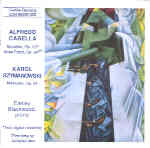Alfredo Casella’s polytonal style makes an acerbic first impression, quickly tempered by the sensuality and registral savvy of his virtuosic keyboard writing. The three-movement Sonatina’s finale, for example, suggests early Bartók at his most unfettered, or the chiming chords and majestic pedal-points Busoni adored and Sorabji supersized. However, the nine Op. 24 pieces are marvelously varied, ranging from murky funeral march to idiosyncratic tango. Pianist/composer Easley Blackwood’s spotless, invigorating performances of this cycle favorably compare with Luca Ballerini (ASV) and Bruno Canino (Stradivarius). In Szymanowski’s Masques, Blackwood stresses crisply defined articulation in numerous arpeggiated figures, ornamental gestures, and repeated notes, plus sharply contoured textures. His approach differs from the wider dynamic range and spacious languor Martin Jones favors (Blackwood plays Szell to Jones’ Giulini in this repertoire). While the recorded sound is a bit dry for such “wet” music, there’s plenty of clarity and impact. Highly recommended.
































